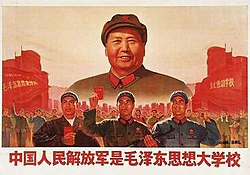Cultural Revolution
| Cultural Revolution | |||||||||||||||||||||||||||

Cultural Revolution propaganda poster. It depicts Mao Zedong, above a group of soldiers from the People's Liberation Army. The caption says, "The Chinese People's Liberation Army is the great school of Mao Zedong Thought."
|
|||||||||||||||||||||||||||
| Chinese | 文化大革命 | ||||||||||||||||||||||||||
|---|---|---|---|---|---|---|---|---|---|---|---|---|---|---|---|---|---|---|---|---|---|---|---|---|---|---|---|
| Literal meaning | "Great Cultural Revolution" | ||||||||||||||||||||||||||
|
|||||||||||||||||||||||||||
| Formal name | |||||||||||||||||||||||||||
| Traditional Chinese | 無產階級文化大革命 | ||||||||||||||||||||||||||
| Simplified Chinese | 无产阶级文化大革命 | ||||||||||||||||||||||||||
| Literal meaning | "Great Proletariat Cultural Revolution" | ||||||||||||||||||||||||||
|
|||||||||||||||||||||||||||
| Transcriptions | |
|---|---|
| Standard Mandarin | |
| Hanyu Pinyin | Wénhuà dàgémìng |
| Gwoyeu Romatzyh | Wenhuah dahgerminq |
| Wade–Giles | Wen2-hua4 ta4-ko2-ming4 |
| IPA | [wə̌nxwâ tâkɤ̌mîŋ] |
| Wu | |
| Romanization | Ven平ho去 du去 keh入min去 |
| Yue: Cantonese | |
| Yale Romanization | Màhn-faa daaih-gaak-mihng |
| Jyutping | Man4-faa3 daai6-gaak3-ming6 |
| Southern Min | |
| Hokkien POJ | Bûn-hoà tāi-kek-bēng |
| Transcriptions | |
|---|---|
| Standard Mandarin | |
| Hanyu Pinyin | Wúchǎnjiējí wénhuà dàgémìng |
| Wu | |
| Romanization | Vu平tshae上cia平cih入 ven平ho去 du去 keh入min去 |
| Yue: Cantonese | |
| Jyutping | Mou4-caan2 gaai1-kap1 man4-faa3 daai6 gaak3-ming6 |
| Southern Min | |
| Hokkien POJ | Bô-sán-kai-kip bûn-huà tuā kik-miā |
The Cultural Revolution, formally the Great Proletarian Cultural Revolution, was a sociopolitical movement that took place in China from 1966 until 1976. Set into motion by Mao Zedong, then Chairman of the Communist Party of China, its stated goal was to preserve 'true' Communist ideology in the country by purging remnants of capitalist and traditional elements from Chinese society, and to re-impose Maoist thought as the dominant ideology within the Party. The Revolution marked the return of Mao Zedong to a position of power after the Great Leap Forward. The movement paralyzed China politically and negatively affected the country's economy and society to a significant degree.
The Revolution was launched in May 1966, after Mao alleged that bourgeois elements had infiltrated the government and society at large, aiming to restore capitalism. To eliminate his rivals within the Communist Party of China, Mao insisted that these "revisionists" be removed through violent class struggle. China's youth responded to Mao's appeal by forming Red Guard groups around the country. The movement spread into the military, urban workers, and the Communist Party leadership itself. It resulted in widespread factional struggles in all walks of life. In the top leadership, it led to a mass purge of senior officials, most notably Liu Shaoqi and Deng Xiaoping. During the same period Mao's personality cult grew to immense proportions.
Millions of people were persecuted in the violent struggles that ensued across the country, and suffered a wide range of abuses including public humiliation, arbitrary imprisonment, torture, hard labor, sustained harassment, seizure of property and sometimes execution. A large segment of the population was forcibly displaced, most notably the transfer of urban youth to rural regions during the Down to the Countryside Movement. Historical relics and artifacts were destroyed. Cultural and religious sites were ransacked.
...
Wikipedia
